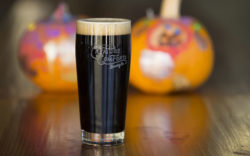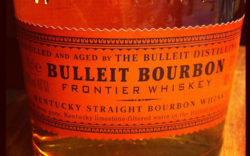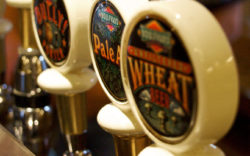Creature Comforts Brewery is up and running, and while you won’t be able to see their beers on store shelves until September, the curious can take a tour of their brewery and sample their offerings. After sitting down with brewers David Stein, Adam Beauchamp and Blake Tyers to discuss—and taste—their creations, I highly recommend you take a few hours and join a tour. You won’t be disappointed.
The brewery currently offers four core beers: Tropicalia, a highly expressive India Pale Ale; Reclaimed Rye, an amber with serious depth of character; Athena, a tart and delightful Berliner Weisse; and Bibo, their pilsner that shows the true potential of a style that macro brewers like Budweiser and MillerCoors have been loading with cheap adjuncts for decades.
Speaking of the Bibo (5.5% alcohol by volume, 25 international bittering units), the late arrival of their pilsner is the reason why Flagpole is running a review of Creature Comforts in July rather than April, when the brewery first opened. The first batch of Bibo was unsatisfactory due to a bad batch of Czech Saaz hops. Instead of delivering the earthy, herbal aroma that is key to the pilsner style, the first commercial batch of Bibo had distinct aromas of horseradish and onion—definitely not what the brewers had envisioned. “It turns out that hops produce these flavors when fighting off insects,” Beauchamp says.
“We chose not to sell it. We want to make sure every beer we sell is top quality,” Stein adds.
While local beer enthusiasts may have been disappointed to hear that they would be waiting an additional month to try Athens’ newest pilsner, the decision to pour the beer down the drain is actually quite encouraging. It shows that Creature Comforts has a serious commitment to quality in its brews.
And Bibo is a seriously delicious pilsner—subtle and nuanced, enhanced with a slight fruit aroma from the addition of Motueka hops from New Zealand. While it belongs to the same family as Heineken, Budweiser and Coors, the Bibo has fuller flavor and showcases what a good pilsner ought to be—crisp and light, with a distinct body from true pilsner malt with a deft hop presence that ties the whole package together. You could split a six-pack of this brew with your cousin who only drinks Bud Light, and you’d both be satisfied.
On the other end of the beer-color spectrum is the Reclaimed Rye (5.5% ABV, 25 IBU), an amber that seeks to defy the bland maltiness that afflicts many craft ambers. The addition of rye malt (rye composes about 25 percent of the total malt bill) adds subtle spiciness to the brew, and aging the beer with French oak for a week provides depth and balance that many ambers lack.
“It’s really good,” Stein says, “and the flavors really open up as it warms.”
I have to agree. On paper, this beer looks like it would trend toward a muddled flavor, uncertain of its identity, thanks to the wide variety of ingredients, but they actually work in harmony. The oak provides balance for rye and enhances the flavor. Simultaneously, the creamy mouthfeel could be overpowering, but the bright effervescence of the beverage keeps the beer from becoming too thick on the palate.
“In a sense, with this beer we’re trying to reclaim American brewing history, in addition to paying homage to our brewing facility, as all of the wood here [in the brewery] was reclaimed during the renovation from Snow Tire,” Beauchamp says. The end result? An invigorating and inspired amber beer that showcases what malts can do (beyond adding simple sweetness) when every step of the process is carefully weighed and balanced.
Tropicalia, the IPA, is also remarkable, but not for its high alcohol content or high IBU count (6.5% ABV and 65 IBU, both mid-level figures for the style). This beer is remarkable for its expressive hop character, which goes beyond the simple bitterness that many people associate with IPAs. The judicious use of Citra hops provides a punchy citrus aroma. The addition of Centennial hops—the true workhorse of the beer and the same primary hop that Bell’s Two-Hearted Ale includes, according to Beauchamp—and a small contingent of Galaxy hops provide Tropicalia with a unique funkiness. The brewers are going for a more complex hop profile, and the finished product has characteristics closer to juicy, ripe tropical fruits than lip-puckering bitterness.
“It’s a personal pet peeve of mine when people say that hops equals bitterness,” Tyers says. “Hops are an integral part of every beer, and we want to challenge people’s perceptions of what hops can do in an IPA.”
Consider the mission accomplished with Tropicalia, a beer designed to please both IPA fans and those who typically eschew the style. Beyond the expressive nature of the hop profile, Tropicalia has a dry finish that doesn’t coat the drinker’s mouth with resinous hop oils—something that all-too-many American IPAs do.
The final of the four beers, Athena, (4.5% ABV) is a member of the Berliner Weisse family, lighter beers brewed with wheat and specific strains of bacteria to provide a tart flavor unique to the style. The brewers describe this beer as a “bookender,” one that appeals to beer geeks looking for flavorful oddities as well as cider and sauvignon blanc wine drinkers who enjoy the tartness provided by an acidic beverage. Athena is a unique member of the style, as Beauchamp, Stein and Tyers had a microbiologist in New England develop a unique strain of lactobacillus for their beer.
The beer blends well with flavor syrups. We sampled the Athena Paradiso, a variety blended with passionfruit and guava syrup, which was delicious without undermining the flavor of the base beer. Creature Comforts has an open invitation to local chefs to provide flavoring syrups for the Athena, and new varieties and interpretations will be available at the brewery.
Creature Comforts has a great lineup; each beer is crafted with a specific goal in mind, and each beer is damn tasty.
Like what you just read? Support Flagpole by making a donation today. Every dollar you give helps fund our ongoing mission to provide Athens with quality, independent journalism.










